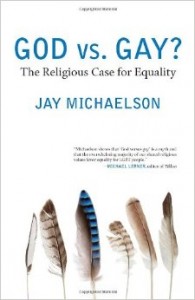 God vs. Gay? The Religious Case for Equality
God vs. Gay? The Religious Case for Equality
by Jay Michaelson
Beacon Press. 232 pages, $25.95
THERE IS no inherent conflict between religious and gay identities and agendas, suggests gay-rights activist and writer Jay Michaelson in a new book titled God vs. Gay? The Religious Case for Equality. Focusing largely on Christianity and Judaism, Michaelson argues that, far from being hostile to homosexuality, religious doctrines can be taken to justify the claims for full inclusion and equality of GLBT people.
Such a proposition would not have occurred to the author some years ago, when he was tormented by the apparent conflict emanating from secret sexual desires and his commitment to Jewish law. From the perspective of the closet, any decision to express his sexual being would amount to a painful compromise, a zero-sum game in which either his faith or his sexual identity lost out; so for years he lingered undecided and closeted. When he finally did decide to come out, it turned out to be a positive-sum game in which the two forces in his life supported and justified one another. Here he offers three lines of reasoning, and the book is organized accordingly.
The first part maintains that the core religious values of love, compassion, honesty, and the like are as applicable to GLBT people as to anyone else. Typically we learn these values from biblical stories that are stubbornly heterosexual, starting with Adam and Eve. So exercise some judgment, Michaelson instructs, to distill the substantive meaning—say, about the desirability of love or companionship—from the unavoidable details (e.g., that the first couple had to be heterosexual). There’s nothing there to exclude another kind of couple from partaking of these values. Why can’t “Adam and Steve” embody one of the shapes that human love can take?
What about the specific references in the Hebrew scriptures and New Testament that purportedly proscribe the love of Adam and Steve? Michaelson next attends to dispelling the authority of the “bad verses,” as he calls them. Whatever bearing one believes they should have on sexual practice, he argues, they should have no bearing on gay identity; they do not command the repression of persons based upon who they are. Consider the most frequently cited verse, Leviticus 18:22 (“Thou shalt not lie with mankind as with womankind; it is an abomination [toeva]”). In Michaelson’s analysis the scope of the rule shrinks dramatically, applying at most to anal sex between males as a practice to be avoided. He interprets toeva extensively by pointing to the myriad of instances in which this predicate is employed throughout the scriptures, which has the effect of enervating its severity. Indeed “abomination” is probably a misleading translation for toeva.
In the third and final part, Michaelson somewhat repeats the logic of the first argument about the universality of values, this time with communal or institutional values and interests. Basically, if equality and tolerance are among the religious guidelines for communities, then these communities should learn how to exercise such values also with respect to gays and lesbians. Put differently, since Adam and Steve are gay, it’s better for the religious community to devise accommodations toward mutual recognition and benefit than to sponsor mutual ignorance or disrespect.
To assess the merits of Michaelson’s case, we note that the argument’s validity is predicated on the notion that homosexuality is intrinsic to a person and not a choice. He tries to substantiate this claim with reference to the scientific literature on sexuality, but this merely evokes the authority of science and cannot prove whether homosexuality is a choice, something that is private and not subject to observation, and thus metaphysical and beyond the scope of science.
God vs. Gay? succeeds in providing a provocative and lucid account of the debate between homosexuality and religion, and in challenging the perception that the great divide cannot be bridged. If nothing else, the book should stimulate debate and action to overcome the paralyzing effect of ignorance. Thus Michaelson’s religious case is also a political one. In the end, of course, how one reconciles being gay with being religious is a personal decision that only the heart can make. Michaelson has supplied the vocabulary and some arguments to help one make that decision.
________________________________________________________
Yoav Sivan, an Israeli journalist, is a visiting scholar in the Dept. of Sociology at NYU. He maintains a website at www.YoavSivan.com.





